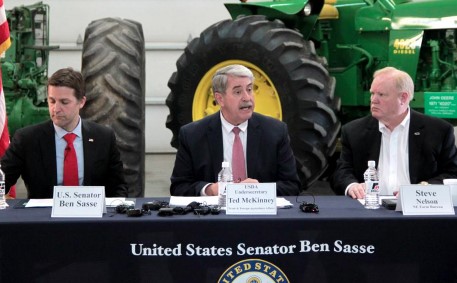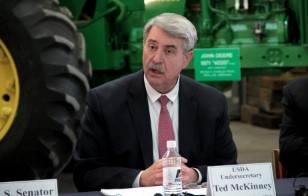By Grant Gerlock

The U.S. Department of Agriculture's undersecretary for trade, Ted McKinney, speaks at a roundtable discussion Wednesday in Omaha, Nebraska, with U.S. Sen. Ben Sasse (left) and Nebraska Farm Bureau President Steve Nelson.
It was an appropriate week for the U.S. Department of Agriculture’s trade expert to address a gaggle of Nebraska farmers — even if their responses tended toward frustration.
Ted McKinney arrived in Omaha on Wednesday, the day China threatened to impose tariffs on 106 U.S. products including major exports like soybeans, beef and corn. China’s move came after the Trump administration’s attempt to reign in China’s abuse of intellectual property rules by proposing tariffs on $50 billion worth of Chinese imports.
If the proposals become reality they could undermine a stagnant farm economy, and not just in Nebraska. “We have bills to pay and debts we must settle and cannot afford to lose any market,” Kansas Farm Bureau President Richard Felts said in a statement.
Earlier volleys in the U.S.-China trade dispute already are hurting farm exports. After the White House put tariffs on steel and aluminum in place last month, China decided to tax pork, fruit, nuts and other products. And when the U.S. began taxing imported solar panels and washing machines, China began investigating imports of sorghum, effectively depressing that market.
“In agriculture it’s rampant,” McKinney said. “Stolen seed germplasm. Not 20 miles from my home (in Indiana), a feed company had some intellectual property stolen. This is an attempt by the president to say ‘There’s probably no good time to do this kind of thing, but we’ve got to get China to play by the rules.’”
China bought $19.6 billion worth of U.S. agricultural products in 2017, and exports are one of the few options that farmers have to raise currently depressed commodity prices — by increasing demand for their products overseas.
McKinney acknowledges that the trade dispute could cut into that strategy.
“Now could not be a worse time with the thin, if not negative, margins our farmers are feeling,” McKinney said. “I would just encourage our farmers and ranchers, and for that matter our processors, to just be patient because this is a longer road and I think the outcome will be good.”

USDA official Ted McKinney says President Trump's tariff dispute with China is meant to stop that country from stealing intellectual property, adding: "we've got to get China to play by the rules."
'Disheartening'
But farmers at an Omaha roundtable questioned whether the administration has a coherent strategy to quickly resolve its trade differences with China.
“This administration seems prone to whatever spur of the moment thoughts that pop into the president’s head,” said Bart Ruth, a corn and soybean farmer from Rising City, Nebraska. Ruth added that farmers and farm groups like the American Soybean Association spent decades building a market in China, and “to see it threatened in a trade war that really makes no sense is disheartening.”
McKinney insisted the administration understands farmers’ concerns and will take steps to protect them from trade retaliation, but said it’s too soon to detail what those steps will be.
He also said the USDA is hoping to calm the waters by working to finalize a new NAFTA agreement with Canada and Mexico — where a large proportion of American exports go — and reopen talks with Japan that could possibly even lead to the U.S. rejoining the Trans Pacific Partnership.
Click here to see more...